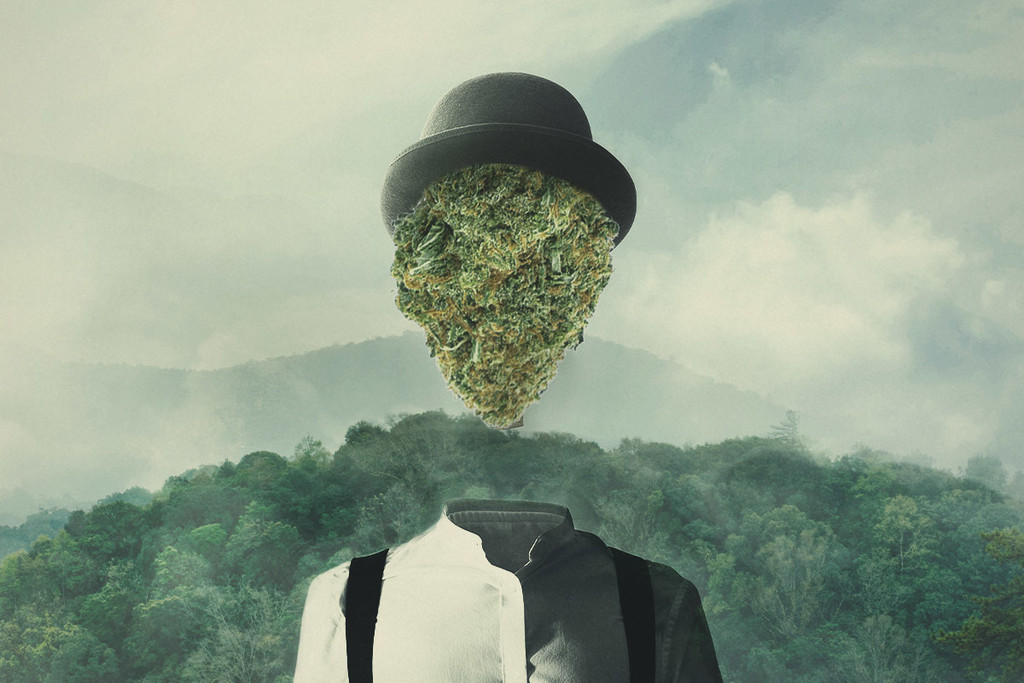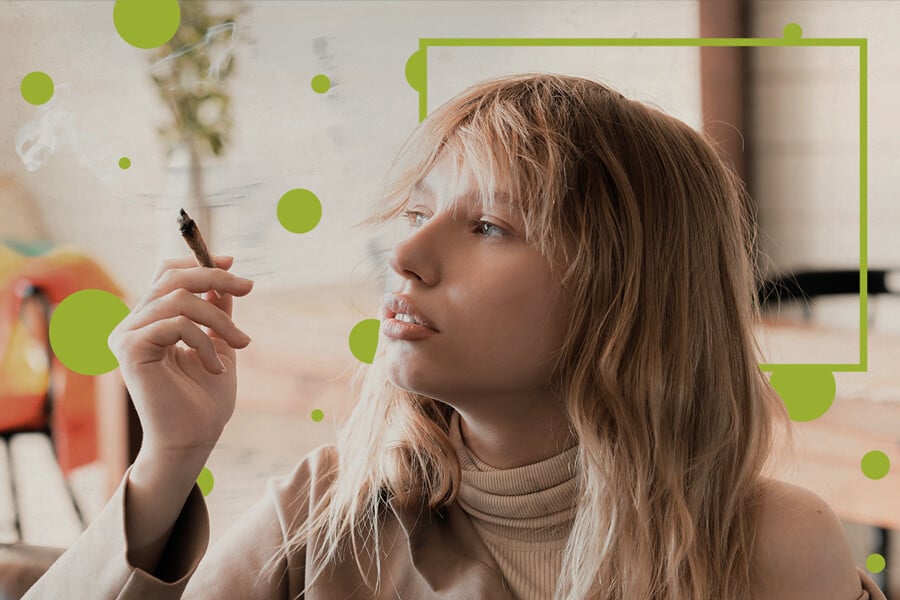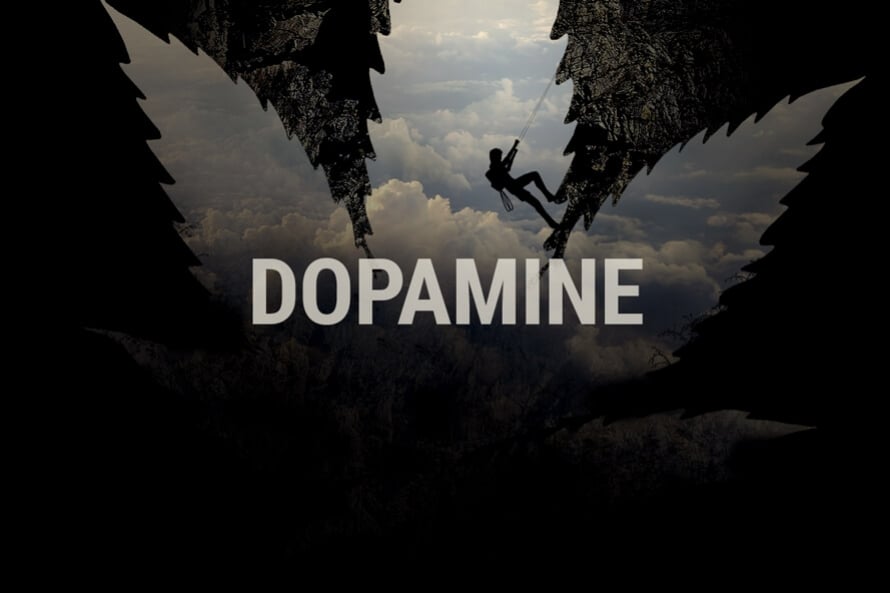.
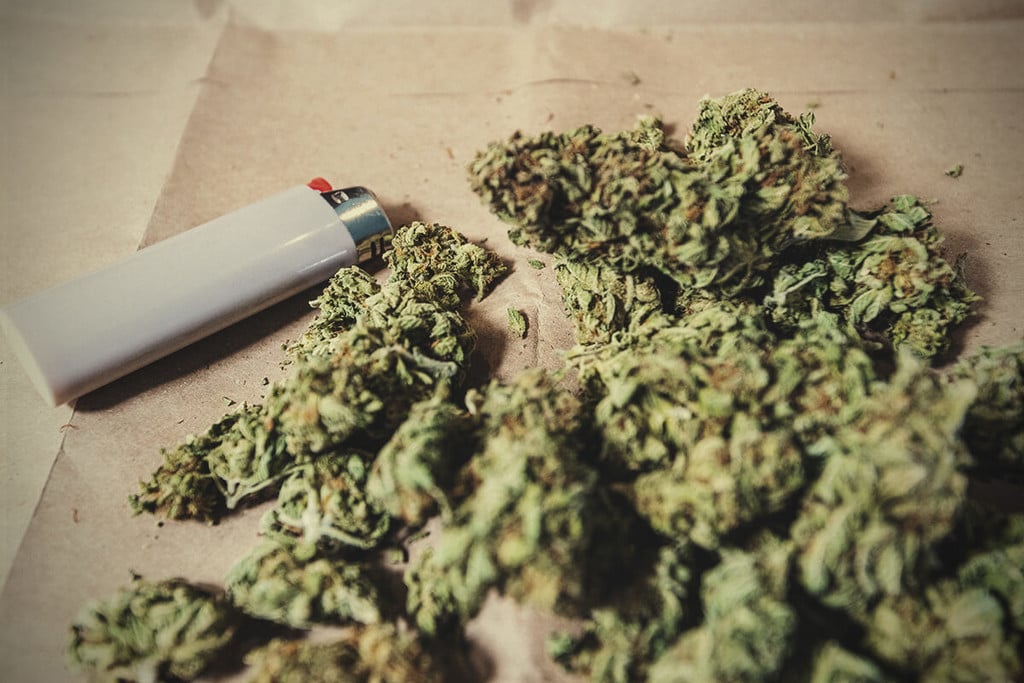
Marijuana Addiction: Find Out What You Need to Know
Can you become addicted to cannabis? Some people become dependant quite quickly, whereas others smoke for years while always maintaining a healthy relationship with the plant. THC definitely creates a shift in the dopamine reward system in the brain, but it's not all about chemicals. Even our childhood and society can impact addiction.
Contents:
Some people can use cannabis for years on end without ever running into any problems. Others smoke the herb only for a short period before developing addictive behaviour.
At one end of the debate, the “Just Say No” crowd present cannabis as a dangerous drug capable of pulling anyone into a state of addiction. On the other side, cannabis advocates defend cannabis as “a plant, not a drug”, and deny that it poses any addictive qualities.
As with most matters, the truth lies somewhere in the middle.
What Is Addiction?
We often associate the word “addiction” with a habit revolving around hard drugs. In truth, people can become addicted to just about anything, from food and caffeine, to the affection of other people[1].
The exact root cause of addiction remains up in the air. Older models suggest it stems from a moral dilemma. Some frameworks suggest that it arises purely from the action of molecules activating receptors. Other addiction specialists point towards complex psychological deficiencies and childhood trauma.
Because addiction appears so multi-faceted, it’s important to explore it fully.
- ? The moral model
- The moral model of addiction[2] blames the individual for their affliction. Developed in the eighteenth century, this model viewed addiction as a sin and held spiritual direction as adequate treatment.
Although many professionals view this model as outdated and archaic, some prominent figures still uphold it. For example, the antagonistic journalist and author Peter Hitchens flat out denies the modern claims of addiction and instead pins all chemical habits on personal choice. He proclaims, “Drug-taking is the purest form of self-indulgence”. - ? The disease model
- Actor and comedian Russell Brand described addiction as an illness[3]. Although he states his own addiction resulted from emotional, psychological, and spiritual causes, he describes addiction as a health matter.
The disease model of addiction[4] agrees with these claims. It points towards an internal state as the root of addictive behaviour. Using a medical viewpoint, it sees addiction as an illness that exists not on a spectrum, but as a disease that somebody either has or doesn’t have.
This view also takes on a rather gloomy approach and regards addiction as an incurable struggle only conquerable by lifelong abstinence. Although the disease model can help individuals understand their behaviour and make addiction a health issue, some experts state that it can remove responsibility from the user. - ? The pyscho-dynamic model
- The physician and author Gabor Mate believes addiction lies in the early childhood environment, as opposed to genes or inert chemical substances. He states, “Not all addictions are rooted in abuse or trauma, but I do believe they can all be traced to a painful experience. A hurt is at the centre of all addictive behaviours. It is present in the gambler, the internet addict, the compulsive shopper and the workaholic.”
This outlook encompasses the views of the psycho-dynamic model of addiction[5]. Originating with Sigmund Freud, this model pins addictive tendencies on childhood experience, and how we cope with them during adulthood. - ? The social learning model
- In the 1970s, the social learning model[6] changed the framework of addiction. It took the state away from mere dependence on a chemical substance and explored the learned behaviour that stems from conditioning and thinking about a substance.
It views dependence as a normal aspect of human behaviour and explores the sense of compulsion and decision making involved in abusing a drug. Ultimately, it views the decision of the individual—when they weigh up the downsides of continued use versus the benefits—as the means of ending addiction. - ? The social-cultural model
- The social-cultural model[7] links social circumstances and inequality to addiction. It views addiction away from the individual and recognises factors in society that may drive people towards substance abuse.
How Marijuana Acts In The Body
But where does cannabis fit into the picture? Why do some people quickly need to consume cannabis every day, whereas others have total control over their intake?
To find out the answers to these questions, it helps to understand exactly how the herb acts in the body.
-
Chemicals in cannabis
Cannabis flowers contain a complex host of hundreds of different chemicals. These molecules exist in groups or families.
The psychoactive molecule that underpins the cannabis high—THC—belongs to the cannabinoid family. This group contains over 100 different molecules. All of them offer slightly different effects, but very few are mind-altering.
Weed buds also contain over 200 terpenes. These aromatic chemicals provide the unique smells and flavours of different strains, and they also work alongside THC to change the effect of the high.
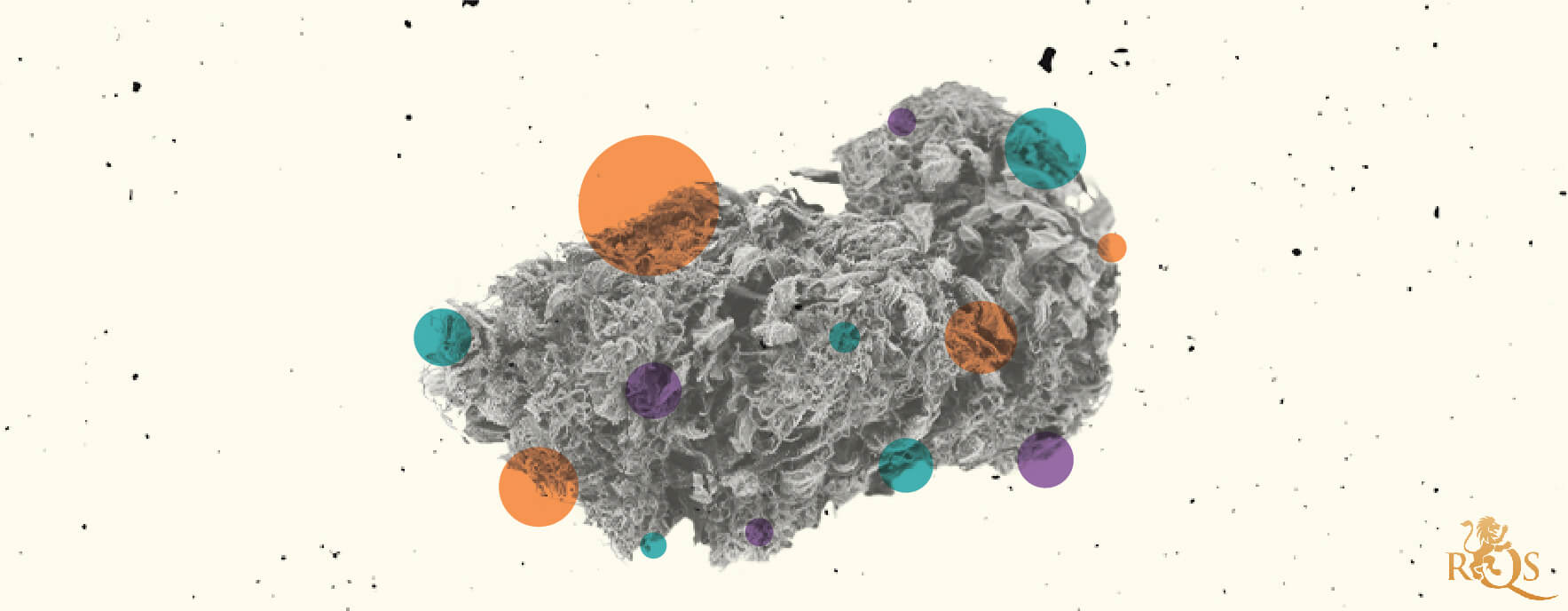
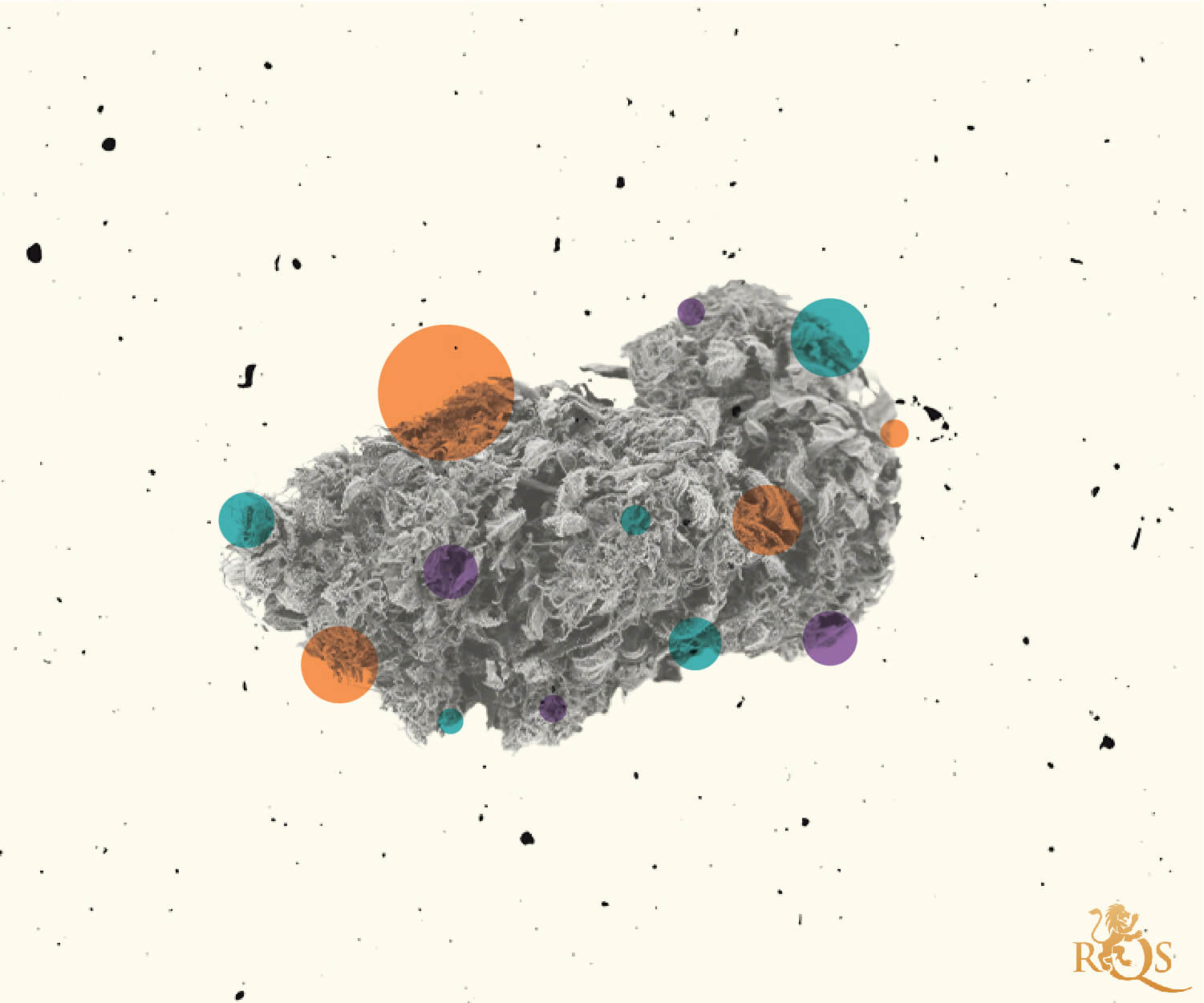
-
The endocannabinoid system
THC temporarily alters our consciousness by working through the endocannabinoid system (ECS). Made up of a series of receptors, signalling molecules, and enzymes, this system helps to maintain balance in the body.
This fascinating network occurs all throughout the body and plays a key role in metabolism, appetite, immunity, cellular communication, and memory. The ECS features two primary receptors: CB1 and CB2.
To operate this system, our body produces its own set of cannabinoids that are tasked with binding to these receptors. Interestingly, THC shares a similar molecule structure to one of our own cannabinoids known as anandamide, otherwise known as the “bliss molecule”.
The CB1 receptor occurs mainly within the brain and central nervous system. Anandamide binds to this molecule to regulate the ECS. Because THC shares a similar shape, it successfully mimics anandamide in the body and also has the ability to latch on to the CB1 receptor.
This mechanism of action underlies the psychoactive effects of THC. It enters the synapses between brain cells and activates CB1 receptor sites. Unlike most receptors, cannabinoid receptors are mostly located before the synaptic space, instead of after it.
This means that activation of CB1 allows THC to control incoming chemical traffic[8]. This alters the flow of molecular information in the brain and gives rise to the high.
We agree that this simple process doesn’t seem to adequately explain the euphoria and increased connection to nature that people feel after smoking a joint. In truth, science doesn’t yet completely understand every aspect of this experience.
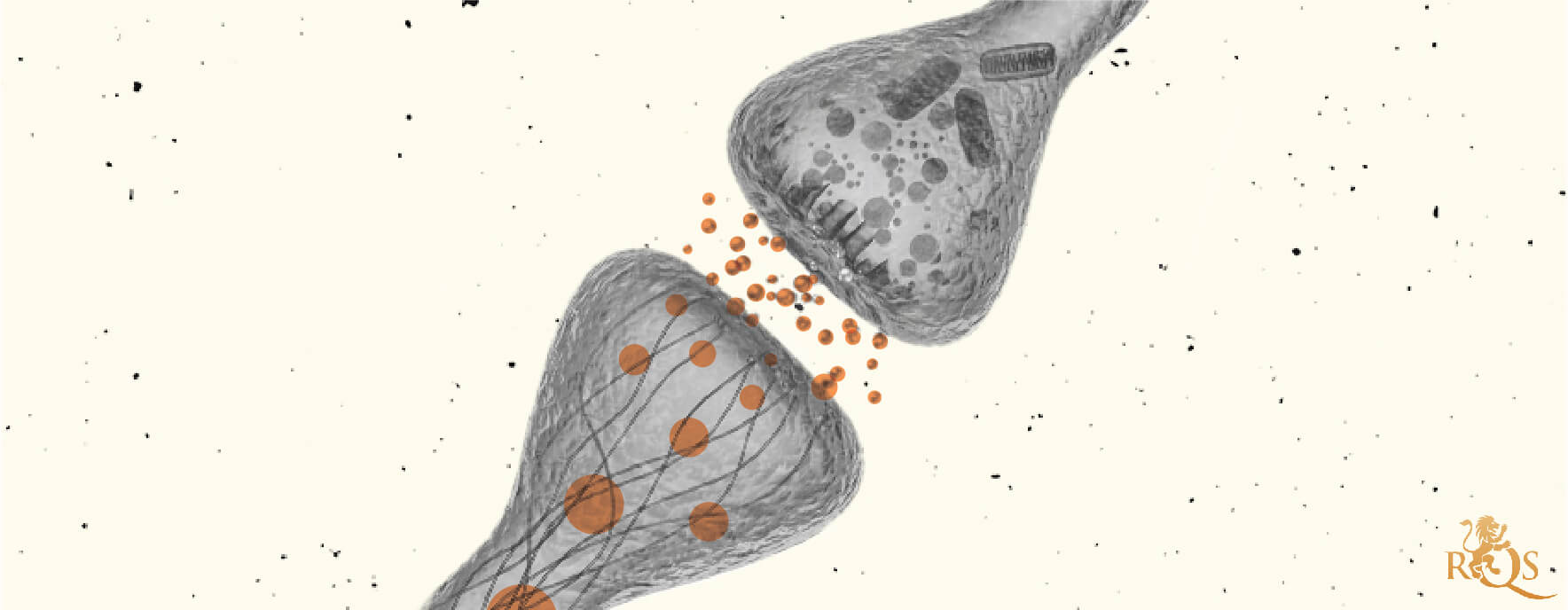
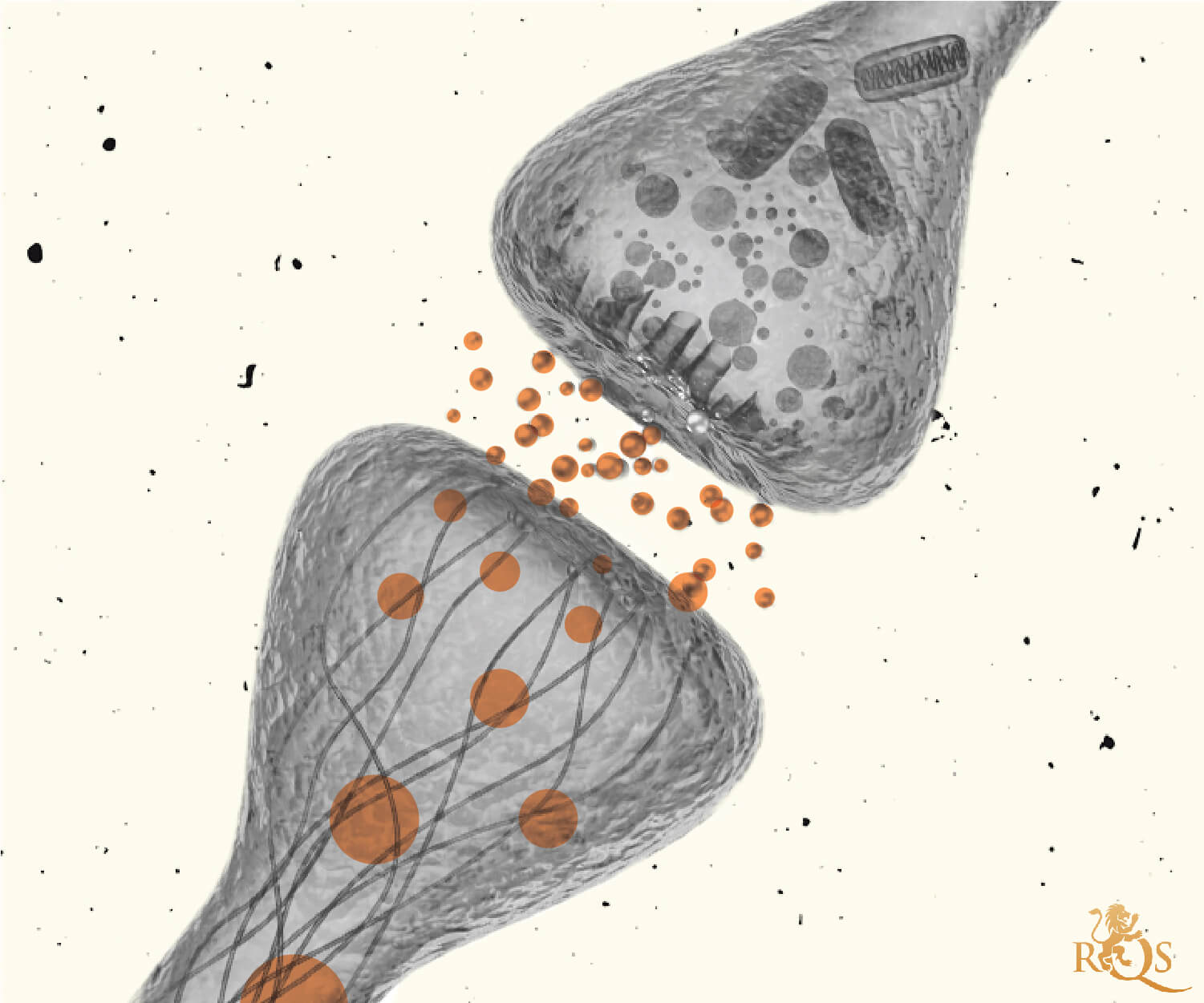
Marijuana Use Disorder
Addiction to cannabis, known as marijuana use disorder or cannabis use syndrome, can occur due to a myriad of different reasons. Regardless of the model of addiction at play, this condition comes about when an individual begins to use weed in an abusive way.
Cannabis produces a pleasant and enjoyable high. Some people bask in the occasional use of the herb. Others quickly feel they “need” this feeling to function at all, as those helps fulfil an empty whole caused by some other failing area of their life or painful past experiences.
Chances are you know plenty of people that use cannabis in a healthy way. However, data collected by the National Institute on Drug Abuse shows that around 30% of marijuana users[9] experience some degree of dependency.
The figures are actually quite striking. Approximately 4 million cannabis users in the United States met the criteria for marijuana use disorder in 2015, and almost 140,000 of them to the extent that they sought treatment.
-
Symptoms
Addiction to cannabis can manifest in an array of symptoms. For some people, they are extremely minor. Although they may “smoke too much”, they remain fully functional. For others, consuming too much cannabis can begin to take a toll on their mental health and work life. Some of the worst symptoms may include:
| Frequent, unexplained absence from work or school |
| Declining performance at work or school |
| Trying but being unable to stop using cannabis |
| Cannabis is used more often and in higher amounts than intended |
| Taking increasing amounts of cannabis despite knowing it causes personal and social issues |
| Lethargy |
| Craving its use all day long |
| Denial |
| Loss of interest in previous hobbies and passions |
| Irritability |
| Paranoia |
| Social withdrawal |
| Depression[10] |
| Frequent, unexplained absence from work or school | Declining performance at work or school |
| Trying but being unable to stop using cannabis | Cannabis is used more often and in higher amounts than intended |
| Taking increasing amounts of cannabis despite knowing it causes personal and social issues | Lethargy |
| Craving its use all day long | Denial |
| Loss of interest in previous hobbies and passions | Irritability |
| Paranoia | Social withdrawal |
| Depression[10] |
-
What separates normal social use from addiction?
Millions of cannabis users enjoy a healthy use of the herb. It helps them stay creative, relaxed, open-minded, and makes experiences such as parties much more enjoyable. But what defines "normal social use" compared to addiction?
When somebody cultivates a normal use of cannabis, they have full control over the herb, without the plant controlling them. They can freely choose when to smoke and how much to smoke during each session.
They can also make it through the day without intense compulsions to light up a joint. Their relationship to the herb doesn't take a front and centre place in their daily lives.
Healthy use of cannabis also usually revolves around social situations. Some people prefer to reserve their stash for parties or small gatherings, and other people also enjoy cannabis alone at home without ever becoming addicted.
In contrast, a person addicted to cannabis will experience chronic compulsions. They're more likely to crave the feeling of being high. They often "need" to use cannabis just to get through the day, instead of enjoying it as a treat once they've earned it.


-
Possible causes of marijuana use disorder
Like the different models of addiction above show, addiction can come about for plenty of different reasons. While many of them undoubtedly play a role in cases of cannabis addiction, research also points towards a role within the reward system of the brain.
Regular and frequent cannabis use over many years appears to lower levels of dopamine, a neurotransmitter that plays a crucial role in motivation, reward, and pleasure. Therefore, it comes as no surprise that some people that become addicted to cannabis wrestle with negative emotion, lack of motivation, and sometimes mental illness.
After smoking cannabis, dopamine levels in the brain spike. Anything that causes this chemical to rise in concentration makes the brain perceive the behaviour as rewarding. The reward pathways in the brain quickly associated cannabis with a good time!
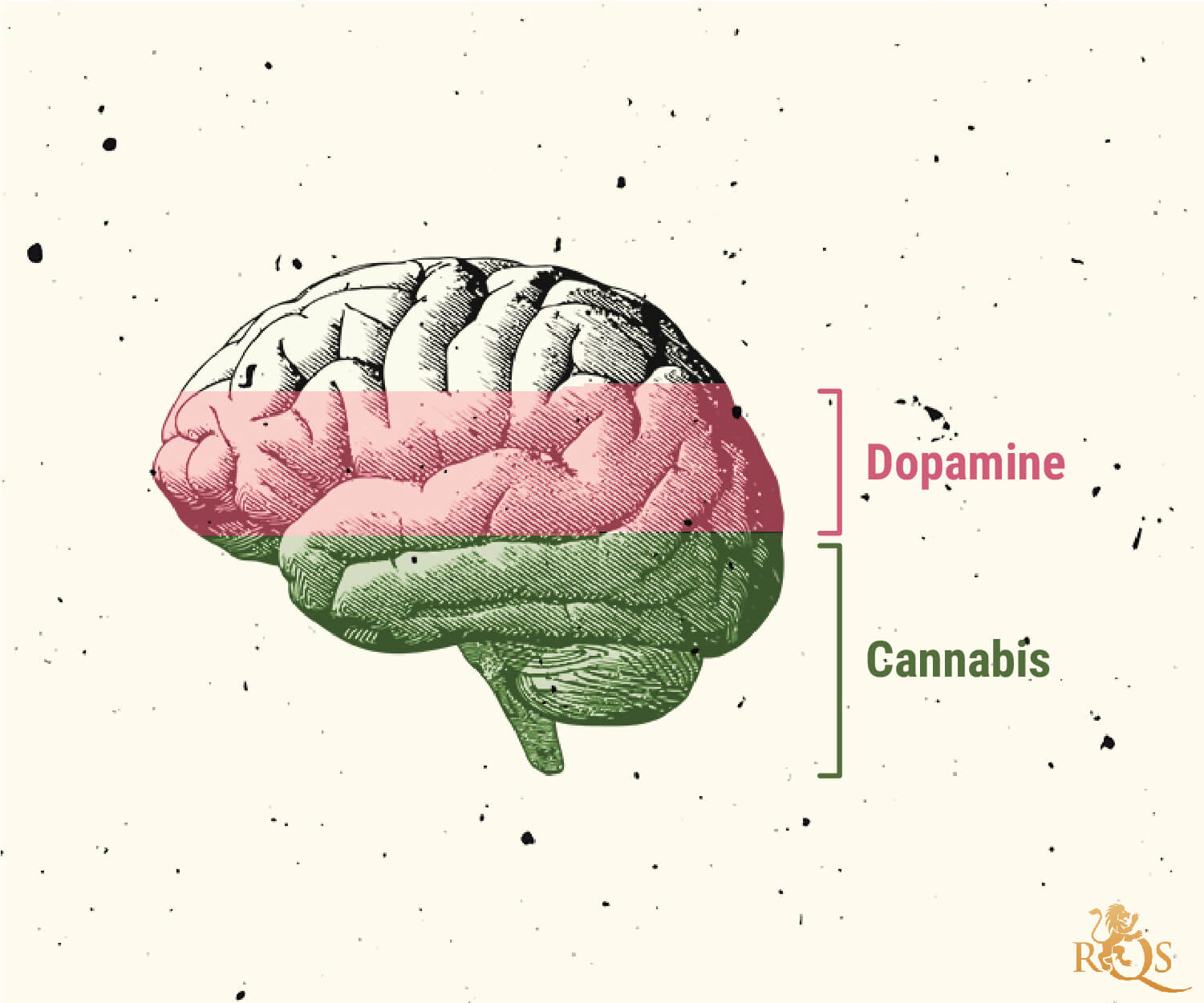
Once in a while, this biochemical state helps to soothe and inspire people. But chronic use can lead to a “blunting”[11] of the dopamine system. It requires more cannabis to feel the same effect, and reduced levels could make other previously enjoyable tasks and hobbies less rewarding.
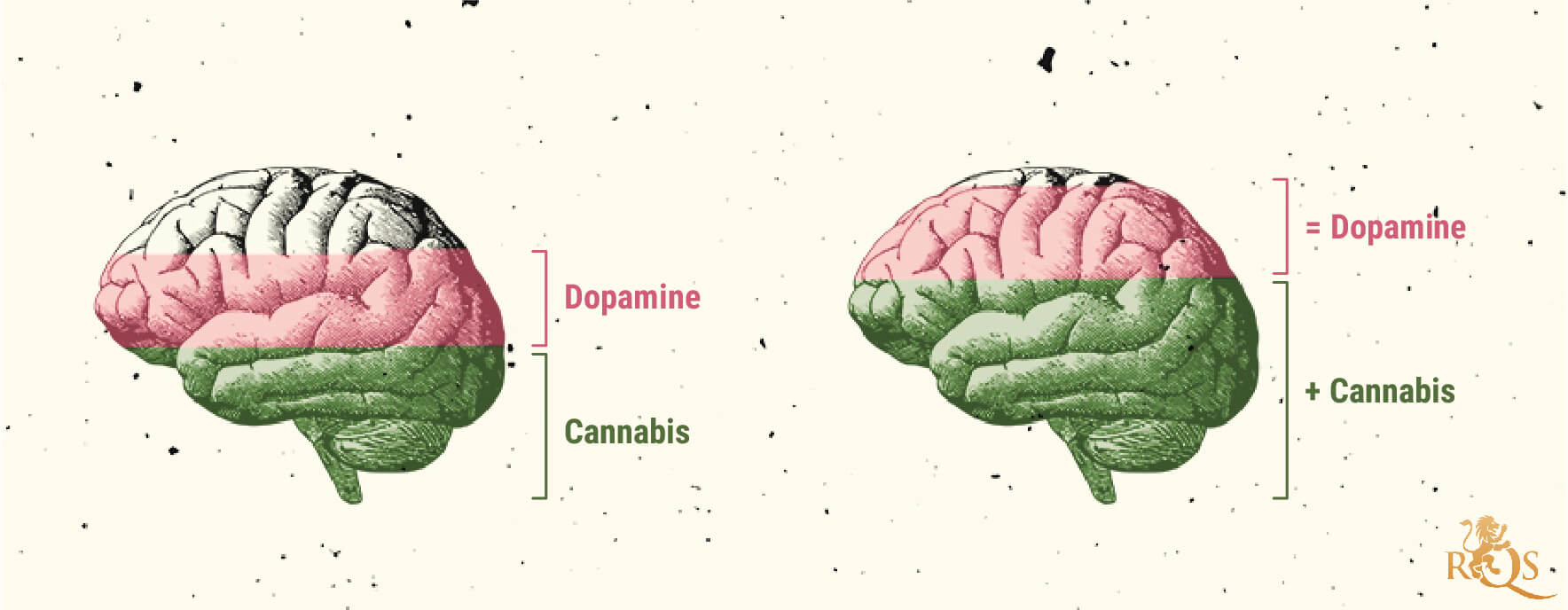
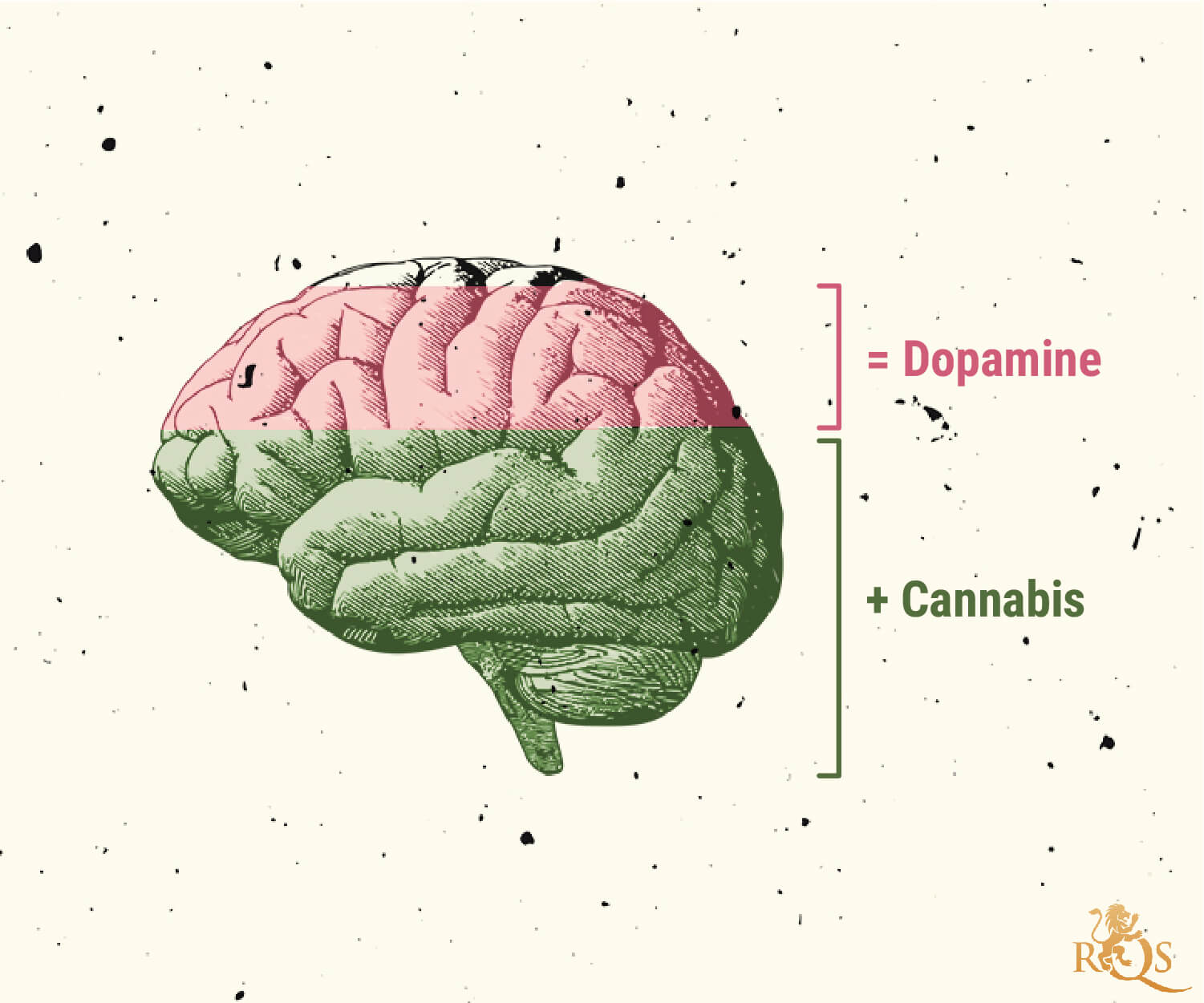
-
Tolerance
If you’ve smoked cannabis for a long period of time, you’ll be well aware of how your tolerance to the herb changes. The first time anyone smokes marijuana, it only takes a couple of hits to feel the effects in all their glory.
Over the next couple of weeks, people find they need to start smoking more to feel the same effect. People that smoke weed for long periods of time can easily polish off a large bag of weed without becoming overwhelmed at all.
The difference here is tolerance. The more cannabis you smoke, and the longer you smoke it, the more you need to feel those original effects. Or you’ll need the same amount, but of much higher quality and strength.
This means that people suffering some cannabis addiction need to consume increasingly higher amounts of the herb to feel satisfaction. If they don’t grow their own, this can start to take a toll on their wallet.
-
Responsible use
If people sometimes overdo cannabis, then what constitutes responsible use? The study of this subject remains quite subjective. Cannabis affects different people in different ways.
The National Organisation for the Reform of Marijuana Laws (NORML) has set forth the Principles of Responsible Cannabis Use[12]. This document details the organisation’s definition of the responsible use of the herb. Their categories include:
| Adults only: | Mind-altering drugs are not suitable for young people. |
| No driving: | The responsible cannabis user does not operate a motor vehicle while impaired by cannabis. |
| Set and setting: | The responsible users should carefully consider where and when they smoke cannabis. |
| Resist abuse: | Cannabis use is considered abuse when it impairs health, personal development, or achievement. |
| Adults only: | Mind-altering drugs are not suitable for young people. |
| No driving: | The responsible cannabis user does not operate a motor vehicle while impaired by cannabis. |
| Set and setting: | The responsible users should carefully consider where and when they smoke cannabis. |
| Resist abuse: | Cannabis use is considered abuse when it impairs health, personal development, or achievement. |
-
Withdrawal
People that become addicted to cannabis can also experience withdrawal symptoms when they attempt to give it up. However, people who have smoked for a long time—without becoming addicted—can also experience these symptoms when they abruptly stop their consumption.
Marijuana withdrawal symptoms include:
| Reduced appetite | Mood changes |
| Irritability | Sleep difficulties |
| Chills | Sweating |
| Stomach problems | Cannabis cravings |
| Reduced appetite | Mood changes | Irritability | Sleep difficulties |
| Chills | Sweating | Stomach problems | Cannabis cravings |
Is cannabis dangerous?
Again, another nuanced topic! Compared to other drugs, both legal and illegal, cannabis boasts a far superior safety profile. Because the compounds within cannabis don't affect the breathing apparatus of the brain, unlike opioids and other drugs, they are associated with almost no overdose fatalities in human history.
However, cannabis can pose some issues. Instead of leading to overdoses, some of these downsides occur over longer periods of time.
-
Effect on teens
Teenagers are more susceptible to the potentially damaging effects of cannabis. It can delay the development[13] of some brain regions and increase the chances of mental illness later in life.
Is marijuana a getaway drug?
No. Many anti-drug groups tout this myth as a common propaganda point. Many people smoke cannabis for years without ever taking harder drugs. Research[14] also shows that people without easy access to cannabis also end up taking harder drugs, without ever using cannabis as a “gateway” to these experiences.
Does legalisation impact addiction?
The legalisation of cannabis in some countries has led to much easier access. Millions of people can now legally purchase cannabis for both recreational and medicinal use.
When it comes to addiction, this liberal move may have a double-edged sword. Heavy and prolonged cannabis use may be increasing in some areas, leading some researchers to voice concern[15] about increases in psychological and physical health.
However, the legalisation of cannabis has helped many who struggle with other addictions. The use of the herb can help people reduce the misuse[16] of opioids, alcohol, and other harder substances.
Tips of using cannabis responsibly
While millions of people enjoy cannabis in a healthy way, others may need to monitor their consumption. These tips can help to keep your relationship with the herb optimal.
| Microdosing | Microdosing involves taking small doses of cannabis that hit right on that sweet spot. You’ll still feel the beneficial effects, but you’ll remain entirely functional and motivated throughout the day. |
| Tolerance breaks | Tolerance can subtly lead people into smoking copious amounts of cannabis, and possibly even into an abusive cycle. Slowly reduce your consumption to avoid withdrawal symptoms, and then completely stop smoking and take a tolerance break for a couple of weeks. This might sound boring and annoying, but when you take that first hit again, it’ll feel like inhaling weed for the first time. |
| Save your herb for the right moment | Saving your stash for the best moments will keep your tolerance down and make you enjoy the herb even more. Getting used to sitting at home every day with a joint between your lips can lead some people down a slippery slope. By saving your weed for visits from friends, social gathering, or days out, you’ll cultivate a much healthier relationship with the herb. |
| Microdosing |
| Microdosing involves taking small doses of cannabis that hit right on that sweet spot. You’ll still feel the beneficial effects, but you’ll remain entirely functional and motivated throughout the day. |
| Tolerance breaks |
| Tolerance can subtly lead people into smoking copious amounts of cannabis, and possibly even into an abusive cycle. Slowly reduce your consumption to avoid withdrawal symptoms, and then completely stop smoking and take a tolerance break for a couple of weeks. This might sound boring and annoying, but when you take that first hit again, it’ll feel like inhaling weed for the first time. |
| Save your herb for the right moment |
| Saving your stash for the best moments will keep your tolerance down and make you enjoy the herb even more. Getting used to sitting at home every day with a joint between your lips can lead some people down a slippery slope. By saving your weed for visits from friends, social gathering, or days out, you’ll cultivate a much healthier relationship with the herb. |
Medical DisclaimerInformation listed, referenced or linked to on this website is for general educational purposes only and does not provide professional medical or legal advice.
Royal Queen Seeds does not condone, advocate or promote licit or illicit drug use. Royal Queen Seeds Cannot be held responsible for material from references on our pages or on pages to which we provide links, which condone, advocate or promote licit or illicit drug use or illegal activities.
Please consult your Doctor/Health care Practitioner before using any products/methods listed, referenced or linked to on this website.
- Addicted to love: What is love addiction and when should it be treated? https://www.ncbi.nlm.nih.gov
- Historical Perspectives and the Moral Model https://us.sagepub.com
- Russell Brand: Addiction is an Illness | Addiction Education Society https://addictioneducationsociety.org
- Disease Model Of Addiction | UK Rehab https://www.uk-rehab.com
- What is a Psychodynamic Approach to… - Caron Treatment Centers https://www.caron.org
- Social Learning and Addiction - PubMed https://pubmed.ncbi.nlm.nih.gov
- Department of Health | Module 5: young people, society and AOD: learner's workbook https://www1.health.gov.au
- How does cannabis get you high? | Live Science https://www.livescience.com
- Is marijuana addictive? | National Institute on Drug Abuse (NIDA) https://www.drugabuse.gov
- Depression and Marijuana Use Disorder Symptoms among Current Marijuana Users https://www.ncbi.nlm.nih.gov
- Cannabis blunts the brain's reward system | Imperial News | Imperial College London https://www.imperial.ac.uk
- Principles of Responsible Cannabis Use - NORML https://norml.org
- News Feature: Cannabis and the adolescent brain | PNAS https://www.pnas.org
- Common liability to addiction and “gateway hypothesis”: Theoretical, empirical and evolutionary perspective https://www.ncbi.nlm.nih.gov
- Marijuana legalization leads to more problematic use, new study finds - Vox https://www.vox.com
- Relationship Between Marijuana and Opioids - NORML https://norml.org


























